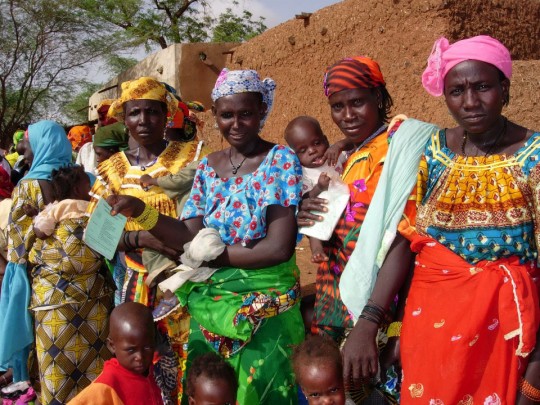UNICEF warns of impending child nutrition crisis in Africa’s Sahel region
UNICEF warns of impending child nutrition crisis in Africa’s Sahel region
 Mothers with hungry children lining up at distribution site in Taoa, Niger, for food handouts
Mothers with hungry children lining up at distribution site in Taoa, Niger, for food handouts
More than a million children in the Sahel region of West Africa are at risk of severe and life-threatening malnutrition over the coming year as a result of ongoing food shortages, the United Nations Children’s Fund (UNICEF) warned today, saying it requires an initial $65.7 million to respond to the crisis.
The agency is already ordering therapeutic foods and distributing emergency stocks in affected countries, it said, adding that the biggest caseload is in Niger, where an estimated 330,600 children under the age of five are at risk.
Niger’s Government has already issued an alert saying more than half of the country’s villages are vulnerable to food insecurity.
Other areas where children are expected to require specialist treatment in clinics are Chad, northern Nigeria, northern Cameroon, Burkina Faso, Mali, Mauritania and northern Senegal.The initial $65.7 million needed urgently will be used primarily for nutrition and health interventions and supplies.
“This children’s crisis is going to be immensely challenging,” said David Gressly, UNICEF’s Regional Director for West and Central Africa. “We do not issue such warnings lightly, but the scale demands an appropriate response that needs to start now.”
“A tragedy will be averted only by an unprecedented effort in the Sahel. This will involve making sure that professionals are on the ground with the right supplies and that enough is done to contain the threat of opportunistic diseases amongst the weakened populations,” Mr. Gressly added.
The initial $65.7 million needed urgently will be used primarily for nutrition and health interventions and supplies.
That amount will have to be increased substantially to ensure sustainable interventions over the course of the coming year, according to UNICEF. There will be need for not only enhanced nutrition and health programmes, but also provision of clean water, sanitation at feeding centres as well as emergency education and protection for children displaced with their families.
According to Elisabeth Byrs, spokesperson for the UN Office for the Coordination of Humanitarian Affairs (OCHA) in Geneva, regional food production in the Sahel is down by 8 per cent compared to last year.
The return of migrant workers from Côte d’Ivoire and Libya to some of the countries in the region further reduced the financial capacity of households as families need to feed those who came back, often returning with nothing, she said.
###
UNICEF warns of looming children’s crisis in the Sahel
Agency prepares for major malnutrition intervention across eight countries in 2012
DAKAR/GENEVA, 9 December 2011 – An estimated 1,025,000 children in the Sahel region of Africa face severe and life threatening malnutrition during the coming year according to the UN children’s agency, UNICEF. The organisation is preparing to meet what it describes as a “huge challenge” and is already ordering therapeutic foods and distributing emergency stocks.
UNICEF’s West and Central Africa office says the biggest caseload, with an estimated 330,600 children under-5 at risk of severe and acute malnutrition is Niger, where the government has issued an alert saying more than half of the country’s villages are vulnerable to food insecurity. Other countries and regions where children are expected to require specialist treatment in clinics are Chad, northern Nigeria, the north of Cameroon, Burkina Faso, Mali, Mauritania and northern Senegal.
“This children’s crisis is going to be immensely challenging. We do not issue such warnings lightly, but the scale demands an appropriate response that needs to start now,” says UNICEF’s Regional Director David Gressly.
“A tragedy will be averted only by an unprecedented effort in the Sahel. This will involve making sure that professionals are on the ground with the right supplies and that enough is done to contain the threat of opportunistic diseases amongst the weakened populations,” Gressly said.
UNICEF needs urgently an initial $65,700,000 primarily for nutrition and health interventions and supplies.. But this amount will be increased substantially to ensure sustainable interventions over the course of the coming year. These will involve not only enhanced nutrition and health programmes but also provision of clean water, sanitation at feeding centres as well as emergency education and protection for children displaced with their families.
###
About UNICEF
UNICEF works in 190 countries and territories to help children survive and thrive, from early childhood through adolescence. The world’s largest provider of vaccines for developing countries, UNICEF supports child health and nutrition, good water and sanitation, quality basic education for all boys and girls, and the protection of children from violence, exploitation, and AIDS. UNICEF is funded entirely by the voluntary contributions of individuals, businesses, foundations and governments. For more information about UNICEF and its work visit: www.unicef.org
###
> United Nations (UN).
 The United Nations was established on 24 October 1945 by 51 countries committed to preserving peace through international cooperation and collective security. Today, nearly every nation in the world belongs to the UN: membership totals 192 countries.
The United Nations was established on 24 October 1945 by 51 countries committed to preserving peace through international cooperation and collective security. Today, nearly every nation in the world belongs to the UN: membership totals 192 countries.
When States become Members of the United Nations, they agree to accept the obligations of the UN Charter, an international treaty that sets out basic principles of international relations. According to the Charter, the UN has four purposes:
- to maintain international peace and security;
- to develop friendly relations among nations;
- to cooperate in solving international problems and in promoting respect for human rights;
- and to be a centre for harmonizing the actions of nations.
###
* The above story is adapted from materials provided by United Nations (UN)
** More information at United Nations (UN)



















